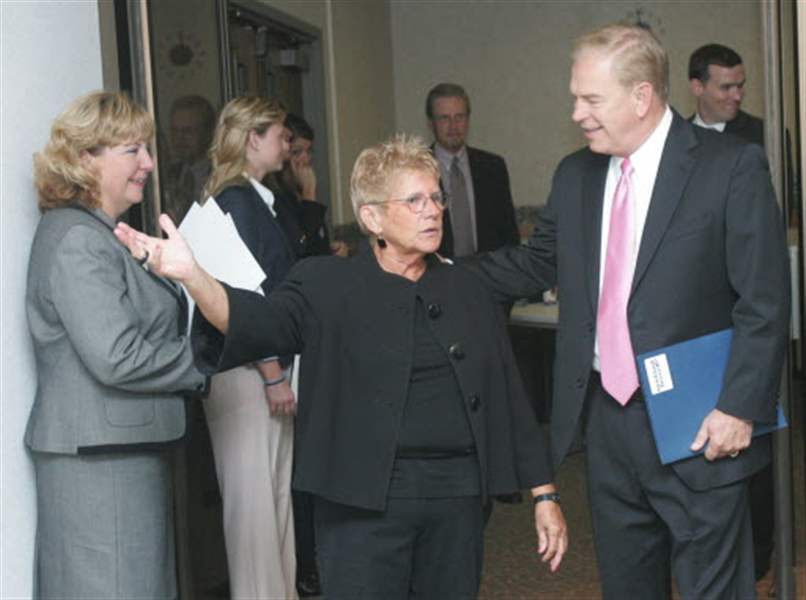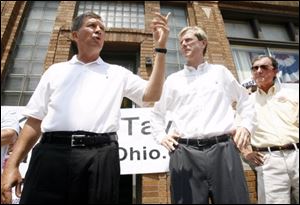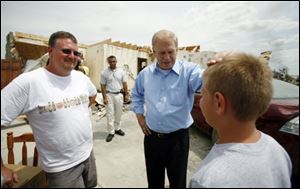
Strickland says he's readied Ohio for growth
8/29/2010
Carol Van Sickle of the Toledo Regional Chamber of Commerce talks with Ted Strickland during a recent campaign stop in the city by the Ohio governor.

Carol Van Sickle of the Toledo Regional Chamber of Commerce talks with Ted Strickland during a recent campaign stop in the city by the Ohio governor.
COLUMBUS - 376,000.
That's roughly the number of jobs that Ohio has lost since Gov. Ted Strickland took office nearly four years ago and a number pointed to at every opportunity by his Republican opponent.
And although the Democratic governor said he believes governors in general get too much credit for the economy when times are good and too much blame when they aren't, he argues that the tough decisions he's made, including continuation of tax reforms his predecessor set in motion before he took office, have better positioned Ohio for growth once the nation emerges from the recession.
"I've never tried to evade responsibility for the things that I have control over," Mr. Strickland said. "I am not responsible for the national recession. I am responsible for the decisions that I have made as we have dealt with this recession. I am more than happy to be judged in that way.

Gubernatorial challenger John Kasich, left, with Lucas County GOP Chairman John Stainbrook, denies Gov. Ted Strickland's claims that the incumbent has whittled away at Mr. Kasich's Republican base.
"The recession was not inevitable," he said. "It was caused by greed. It was caused by Wall Street decisions that had an impact on the national and international economies of the world. When the recession descended upon us, my responsibility as governor was to manage the state as carefully as possible and try to live within our means due to the decreasing revenue coming into the state and at the same time continue to invest in those things that are essential for future growth."
Mr. Strickland, 69, is locked in a fierce fight for a second term against John Kasich, a former congress-man, Fox News political pundit, and Columbus manager for Wall Street's failed Lehman Brothers.
Mr. Strickland - a former congressman, a Methodist minister, and former prison psychologist - told The Blade during a recent interview in his campaign headquarters that he believes he has cut into Mr. Kasich's Republican base.
The governor hails from a rural Appalachian Ohio area that repeatedly sent him to Washington. He has twice garnered the endorsements of the National Rifle Association and Fraternal Order of Police, groups that more often than not have supported Republicans.

The blade Gov. Ted Stricklandtalks with Doug Wyatt, left, and his son Devon, 11, at the site of their tornado-ravaged home in Ottawa County's Williston. Mr. Strickland visited the area twice in the days immediately after the storms in early June.
And he has stood alongside business and manufacturing representatives when pushing for electricity market reforms and championing the preservation of Republican-enacted tax reforms despite opposition from his Democratic base.
"I think [some in the business community] have confidence that I am a leader not prone to exuberant and reckless proposals such as eliminating the state's income tax. I've talked to a lot of corporate leaders who recognize that as sort of a nutty idea," said Mr. Strickland in a direct criticism of Mr. Kasich.
Mr. Kasich, who has the backing of the National Federation of Independent Business of Ohio, said he doesn't buy the suggestion that Mr. Strickland has whittled away at his base.
"The numbers don't reveal any of that," Mr. Kasich said. "The problem he's had is all the negative attacks on me have backfired on him. It's driven up his negatives. For instance, the NRA. I'm not an enemy of the NRA. We just have a disagreement on a vote I cast" in favor of an assault weapons ban while in Congress.
"I'd like to have the endorsement, but gun owners know I'm not anti-gun," he said. "I never have been. I was endorsed by the NRA before the vote … They're trying to make somebody into something they're not. That never works in politics."
Mr. Strickland grew up in poverty and tells the story of how his family once lived in a chicken coop after their house burned. The son of a steelworker and the eighth of nine children, he was the first in his family to attend college.
He received a bachelor's degree in history, master's degrees in guidance counseling and divinity, and a doctorate in counseling psychology. He worked as a psychologist at the state prison in Lucasville and as a Methodist minister. His wife, Frances, whom he married while they were in their 40s, is a former education psychologist.
Mr. Strickland lost his first three bids for a southern Ohio congressional seat before being elected in 1992. But he was among the Democrats ousted two years later in the Republican "Contract with America" wave. He returned in 1996, and voters sent him back for four more two-year terms.
He benefited from a Democratic surge in 2006 when disillusioned Ohio voters swept the GOP from every statewide executive office except one. He captured more than 60 percent of the vote against conservative Republican Ken Blackwell, becoming the first Democratic Ohio governor in 16 years.
This year, Ohio polls and election results in other states suggest the wind is in his face rather than at his back.
His policies as governor to expand access to health care, pass taxpayer-funded job-creation programs, and accept federal financial help have largely dovetailed with those of President Obama.
He has broken with the President, however, when it comes to Mr. Obama's cap-and-trade energy proposal out of concern that the resulting emissions controls would adversely impact industrialized states such as Ohio.
In addition to Ohio's economic woes and high unemployment, his administration has been plagued by a series of embarrassments, some of which led to resignations of high-profile aides.
Early in his term, a computer tape containing the personal information of taxpayers and state employees was stolen from a car when policy allowed an intern to take it home.
The Department of Job and Family Services was caught conducting improper background checks on Samuel "Joe the Plumber" Wurzelbacher after his talk about taxes with Mr. Obama in Springfield Township made him a focus of the 2008 presidential debates.
The Ohio inspector general determined that his public safety director improperly halted a contraband sting involving prisoners working at the Governor's Residence and that his school facilities director has favored union contractors.
Mr. Strickland, meanwhile, has both pleased and aggravated his union backers.
Through executive order, he extended collective bargaining rights to home health-care nurses and independent child-care contractors. But he also pressured public employee unions to agree to concessions to help balance the current $50 billion, two-year budget.
"I believe in shared sacrifice," he said. "I have cut my own pay … I continue to pay for all of my health insurance for me and my wife, taking no public subsidy. I have asked our state work force to take 10 unpaid furlough days each year of the two-year budget without receiving pay increases over that period of time.
"I compare that, quite frankly, with my opponent who, the year that Lehman Brothers declared bankruptcy, received a $400,000 bonus from this bankrupt company," Mr. Strickland said. "He's refused to tell us how much money he'd gotten as a result of his time with Lehman."
While generally saying that he believes a tax hike would be unwise, Mr. Strickland has refused to promise he would never raises taxes, as Mr. Kasich has done. Such a pledge, the governor said, would be irresponsible, particularly on top of Mr. Kasich's proposal to gradually eliminate Ohio's personal income tax that represents some 45 percent of state revenue.
"And he wants to immediately get rid of the estate tax, 80 percent of which goes to local governments," Mr. Strickland said. "That's hugely irresponsible. It would cripple this state for decades if he were to actually do what he says he wants to do. That's why I think so many in the business community - some quietly, some not so quietly - are supporting me because they really have a concern about his reckless approach to very serious issues."
Mr. Strickland also defends two high-profile about-faces he made as governor last year, championing slot machines at racetracks and successfully pushing for a two-year "delay" of the final 4.2 percent increment of a total 21 percent income tax cut set in motion in 2005. He previously had opposed both.
"I think what people would not want would be a governor or any other official that would take a position and be so inflexible, so rigid, hard-headed, or stubborn that they would not be willing to apply common sense to the conditions as they developed," he said.
And he noted that such business groups as the Ohio Chamber of Commerce sided with him in his deci-sion to shelve the tax cut as an alternative to a tax hike elsewhere or a major cut in the state's education budget.
The governor has said he didn't believe his first term could be considered a success if he didn't address the school-funding issues that have plagued the state.
His last budget included a series of education reforms, including a push for all-day kindergarten and a reworking of the state's school funding formula, but a large chunk of the promised additional funding would be phased in over time.
As the state faces a revenue shortfall estimated as high as $8 billion going into talks on the next two-year budget taking effect July 1, 2011, the governor said he will "fight as hard as I can fight" to protect K-12 education from budget cuts.
"If you want to know how I am likely to deal with a serious budget problem, you look at how I have currently dealt with a serious budget problem or in the recent past," Mr. Strickland said. "I have made reductions. I have looked for efficiencies. I have sought additional resources from the federal government. I will approach the next budget the same way I've approached the last two budgets."
Contact Jim Provance at:
jprovance@theblade.com
or 614-221-0496.